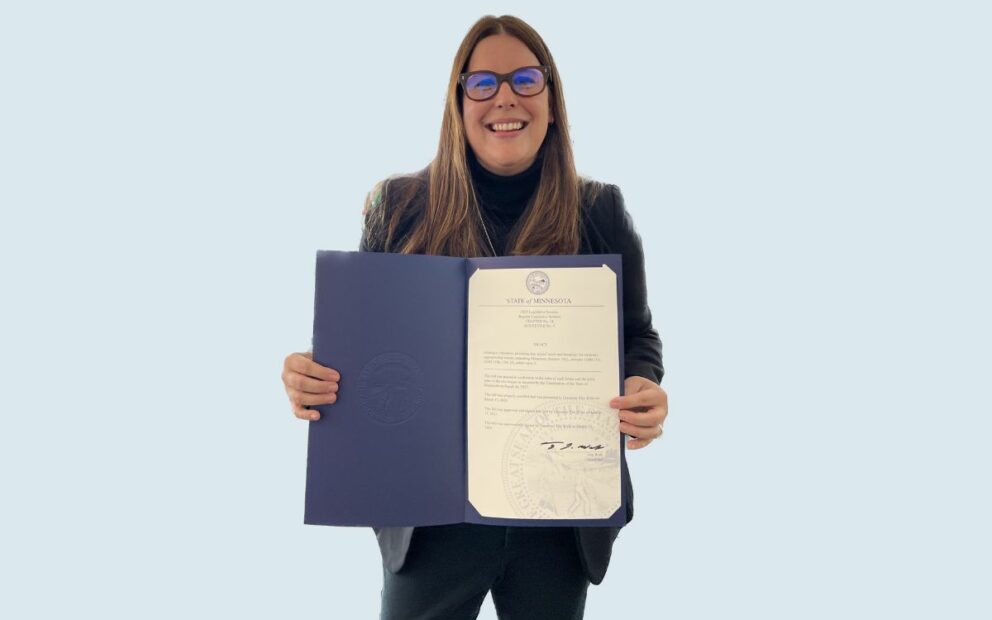Fifteen-year fight for dignity begins, ends with Legal Aid

The person behind the curtain of a better Minnesota is arguably Legal Aid’s Jessica Webster. Driven by an innate sense of justice and a need to see that marginalized families and children are not stigmatized, penalized or made to suffer — because their means are less than most — Webster has zero ego.
On the sidelines of news pressers, at the ready with legislative facts, she prefers to let coalition partners and affected citizens take center stage when news reporters and camera crews are around. Her gifts are holding court with moxie in legislative hearings and building coalitions with the dedicated and undeterred.
But make no mistake, in recent years, it’s her fingerprints that likely have been the first on poverty law affecting families. A Legal Aid staff attorney with the Legal Services Advocacy Project (LSAP) for 18 years, among Webster’s very recent legislative victories are the Minnesota Family Investment Program and the Child Tax Credit. Another headliner that resonates with constituents across Minnesota is 2023’s passage of free universal school meals. What they and others may not know is Webster was at the very beginning of that fight, too, back in 2008.
“That’s the year when the first complaints about lunch shaming came into Legal Aid,” Webster says. She investigated, interviewing families, students and school personnel across Minnesota. With reams of documented cases, she fired off a letter to the Attorney General’s office. She proceeded to build a coalition, pushing the first legislative provisions banning lunch shaming. That bill eventually became law in 2014.
Despite passage, many schools didn’t heed the law or they misinterpreted it. Determined, Jessica mobilized again, “I thought the law was very clear, but we developed even more explicit legislative language, which the legislature adopted in 2017 and again in 2021. We said, ‘This is what lunch shaming is: You can’t block kids from extracurricular activities. You have to have a policy ensuring dignity. You cannot deprive students of a meal because they have a lunch debt.’”
That wasn’t enough. “Kids were still being blocked from graduation ceremonies in 2019,” prompting her to call on the AG’s office to enforce the law. After alerting them again in 2022, the Attorney General responded, confirming schools were violating laws banning lunch-shaming.
So, Jessica leveled up. The coalition — she built with policy partner Colleen Moriarty of Hunger Solutions over the course of 15 years — renewed their approach. They decided universal free school meals would eliminate lunch shaming altogether. That effort, combined with the electorate’s will to vote in the most progressive legislature seen in decades, saw the 2023 passage of universal free school meals.
As monumental and nation leading as that is, what is Jessica most proud of? She says, “Ending unnecessary penalties and harsh qualification rules for public benefits and increasing assistance levels.” She cites these as some of her hardest fights. “Moms [in poverty] used to experience a penalty to their cash assistance when they had a new baby, known as the “family cap.” And parents with disabilities were penalized if they accessed SSI (Supplemental Security Income). “We repealed those unjust laws after several years of advocacy.”
And there’s the rub, “several years.” When Jessica got into the political arena of legislative advocacy, she was not prepared to play the long game. In fact, she almost quit.
“In my second year in Legal Aid’s Legal Services Advocacy Project, after losing absolutely every legislative fight I had undertaken, I felt useless and hopeless. I was crushed to be letting down thousands of Minnesota families and kids. My boss at the time bought me dessert and very gently said, ‘Isn’t that an incredible privilege that you could quit a hard job and find something easier and more satisfying to you?” Her boss continued, Jessica remembers, saying, “’The people we represent can’t quit the hard things.’ I already had a lot of pluck, but something that day made me re-commit to doubling-down on the harder fights.”
Whether they know it or not, this year 800,000 K-12 students and their families are the beneficiaries of a system that works for them, because Jessica Webster works for them, even if it takes decades.
This story highlight is from the 2024 summer release of Mid-Minnesota Legal Aid’s 2023 Annual Report.

